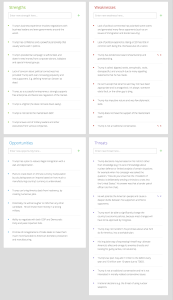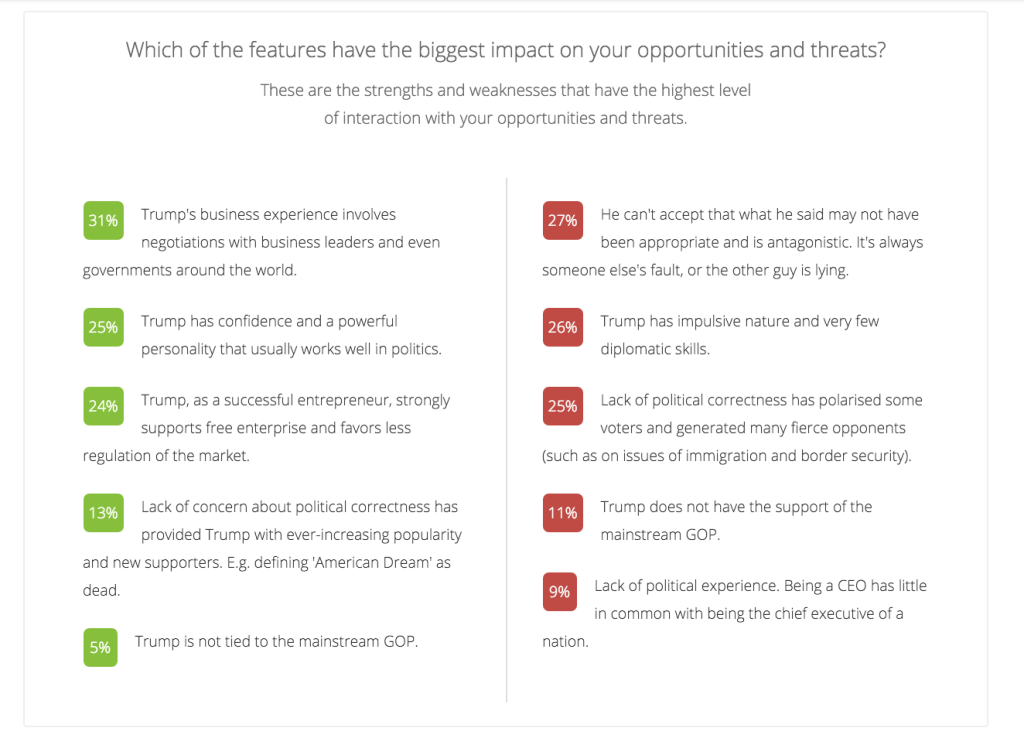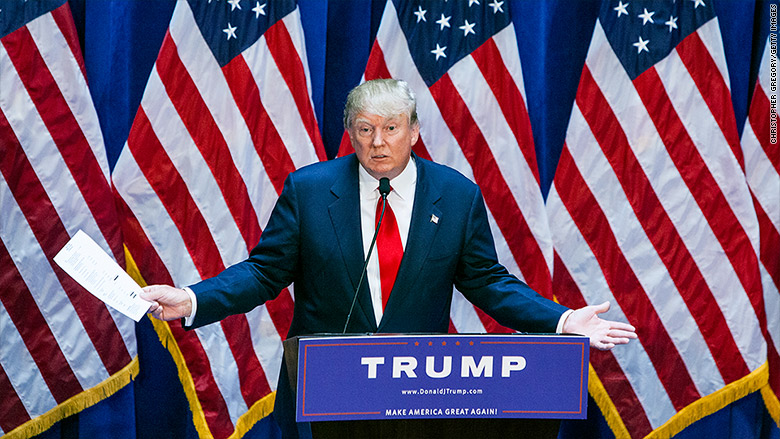The article is based on Donald Trump SWOT analysis, which can be found in the Library, in CayenneApps SWOT application.
“The wall got 10 feet taller,” said Donald Trump, just after winning the primaries in South Carolina. What he meant was the wall on the US southern border which he wants to build to stop illegal immigration and, as he previously suggested, he wants to be funded by Mexico.
A few days before, Pope Francis, after a pilgrimage to Mexico, which included a mass on the Mexican side of the US border, said that a person who thinks only of building walls, wherever they may be, and not building bridges, is not a true Christian.
So, who was the politician that without hesitation immediately replied to the pope and called his comments “disgraceful”? What sort of president might he be for the US and what type of relationships will he build with other countries?
Let’s take a look at SWOT analysis of Donald Trump, and verify if people should either fear or be grateful for such a candidate.
Lack of political correctness

Trump’s campaign is full of contradictions. His unorthodox style and his willingness to say things that typical politicians won’t, e.g., defining the “American Dream” as “dead,” made him very popular among fed-up and impatient Republican voters waiting for a significant change. But, on the national and even global scale, the same lack of political correctness which is perceived as a valuable asset also polarizes voters and generates many fierce opponents.
This is not surprising when Republican candidate declares that he would prevent Muslims from entering the U.S., or is open to establishing a database for all Muslims living in the United States. Some people love these ideas, but others portray them as an open war between the United States and Islam and predict that it might not only worsen the relationship between different religious groups in America, but also end in a further escalation of the conflict with ISIS.
For some people, the ideal presidential front-runner should bring hope for burying the hatchet among people, but Trump is not Kasich. When we talk about the controversial businessman, the threat that he will polarize the American people and cause a deeper divide between his supporters and opponents is more than theoretical.
One of Trump’s main weaknesses is that he can’t accept that what he said may not have been appropriate and can be seen as antagonistic. It is always someone else’s fault, or the other guy is lying. We observed an example of this attitude during the last Republican debate when Trump called Cruz a “basket case” and a “liar” and named Rubio the “choke artist.”
But the same debates also revealed some of Trump’s significant strengths. They confirmed that Trump is a fighter, doesn’t back down easily, and that he has the confidence and a powerful personality that usually works well in politics.
Unfortunately for him, his strong presence often transforms into showmanship and grandstanding. His controversial opinions and many appalling statements, consequently, have lead to many unfavorable titles being assigned to the candidate, such as sexist, xenophobic, racist, disrespectful, and uncouth.
But, with Trump nothing goes by the book. Such nicknames would be a significant burden for any other candidate, but not for him. Paradoxically, they even strengthen him more.
One thing is for sure — these fireworks are dazzling, but whether they would be enough to beat the Democratic nominee is questionable. Even though the Republican debates are very vivid and full of personal attacks, insults, and arguments which might get the audience’s attention, they often lack constructive and substantive merits, such as how precisely candidates will transform their promises for Americans into a workable plan — a plan such as Hillary Clinton, the probable Democratic nominee, claims to have.
Innovative negotiations
A few question marks about the plans lies behind the issues of how exactly Trump plans to convince Mexico to build a wall, or persuade China to crack down on its currency manipulation.
Undoubtedly, Trump has extensive skills to do business. He, as a successful entrepreneur, learned during his business career not only that free enterprise and less regulation of the market are essential to a company’s prosperity, but also gained experience that involves negotiations with business leaders and governments around the world. During his campaign, he has recalled many times, as one of his major assets, his team of world-class negotiation experts that stand behind him.

But on the other hand, is suggesting that the President of Mexico is deliberately sending criminals, drug dealers, and rapists to cross into the United States and his claim that he acquired knowledge about such situation from a private conversation with a border patrol officer an evidence of valuable negotiation skills?
Personal insults, feather ruffling, threats, and warnings might work during the debate when the main goal is to annoy the opponent and play down his position. However, seeing negotiations as a win-lose scenario is rarely conducive to building long-term relationships with your counterpart — especially when we are talking about international relations, in particular with close neighbors.
In fact, Trump’s impulsive nature, limited diplomatic skills and his particular way of expressing himself may alienate America’s allies and enrage its enemies. This could be true, even if he claims to know a lot of military leaders and other executives from various companies, which, in his opinion, are essential for making trade deals much more favorable to American domestic production and manufacturing.
But, in analyzing his previous public speeches and campaign rallies, one may have serious doubts as to whether he can actually deliver positive results from such negotiations. In order to change the country’s economic policies, the president needs to have the approval of the Congress, and Trump’s success in his mission to make America great again highly depends on his ability to negotiate with both the GOP and the Democratic Party. And for now, Trump is despised not only by many Democrats but also by the mainstream GOP, of which he has little support.
Not a true Republican
What puts Trump notably outside mainstream Republican positions is his previous support for a single-payer health insurance system, his past support for abortion rights and a ban on assault weapons, and, most of all, his willingness to raise taxes on the wealthy, impose tariffs that restrict free trade, and increase the tax burden on American corporations.

The former House Majority Leader, Eric Cantor, recently warned, “Donald Trump as the Republican nominee would be catastrophic for Republican hopes to win the White House and maintain control of the Senate and would damage the party and the conservative cause for years to come.”
But, do you remember that with Trump, nothing goes by the book? On the one hand, the GOP revolt and sustained attack by party elders may become more fierce as the controversial billionaire gets closer to being the party’s nominee, but, on the other hand, Trump’s being at odds with traditional Republican values hasn’t seemed to have affected his victories in states that seemed tailor-made for Cruz: Southern, conservative, and chock full of evangelical Christians.
So, why do people vote for Trump anyway?
A lot of Americans think it would be better to have a President that has experience as a businessman rather than a politician — therefore, Trump successfully resonates with people regarding their fears and expectations.
First of all — he presents himself as non-politician, and blames politicians for killing the American Dream:
“The country is going to hell; we have people who don’t know what they’re doing in Washington.”
He regularly emphasizes that his presidential campaign is self-funded, and doesn’t need money from corporate donors, lobbyists, and special interest groups.

He promises to rebuild America and bring it back from insolvency, by creating numerous jobs, renegotiating trade deals and reducing illegal immigration. He claims to be tougher on ISIS than any other candidate. He vows to “bomb the hell” out of ISIS in Iraq — especially the oil wells it’s captured there — to deprive it of income. He promises a series of victories.
“We will have so much winning if I get elected that you may get bored with winning.”
Apparently, he is great at one important thing — he says what people want to hear, and his rhetoric pleases many voters.
Summary
Trump has raised the standards of expectation very high without precisely explaining how he will deliver on most of his promises. If he wins the Republican nomination (and this seems to be more and more probable), those unanswered questions will dog him throughout the general-election campaign.
Personally, I would feel more comfortable knowing that the person who decides about using a nuclear weapon is reliable and predictable, and up until now Trump does not seem to be such a person. But, the question arises: what do most Americans want and expect? We will soon find out.





